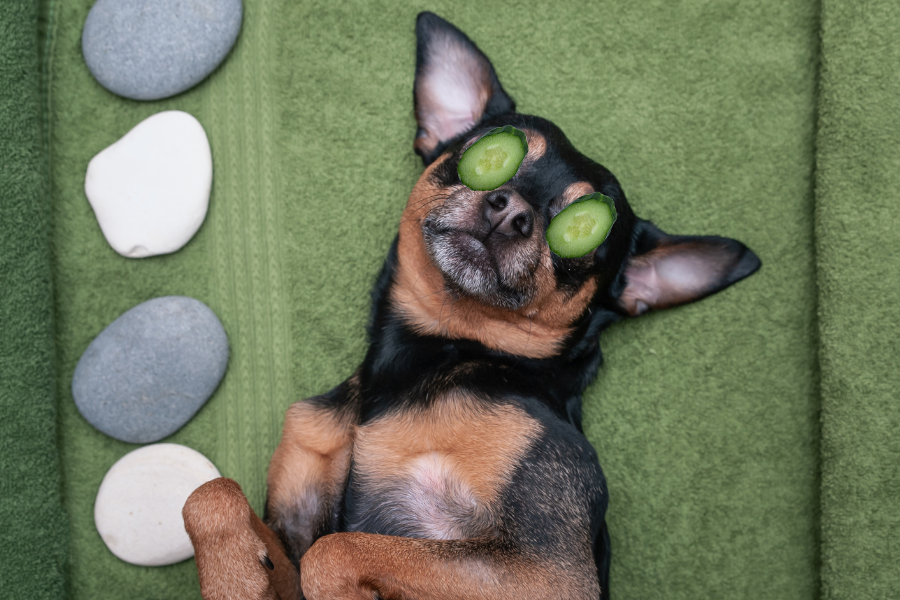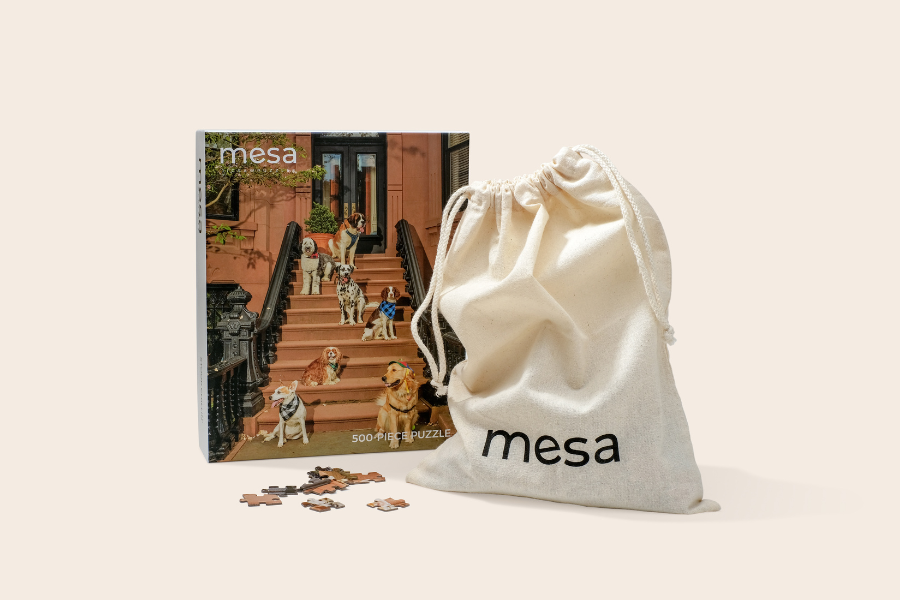Dogs, those fuzzy, wiggly love machines, don't come with their inner strings labeled. Unfortunately, anxiety is a showstopper that can turn your pup's tail from a non-stop merrymaker to a quivering mess. Sure, you could wrap your pup in bubble wrap or hire a 24-hour stand-up comedian, but there are more practical ways to tackle doggie anxiety.
In this guide, we're bypassing the pharmaceutical scene and guiding you through a serene meadow of natural remedies to calm your canine. We'll sniff out the reasons your pup might not be living its best, most chill life, and give you the scoop on calming their nerves. From essential oils to exercise routines, here's how to give your dog the ultimate 'paws' and tell anxiety to fetch itself.
Causes of Anxiety in Dogs
Before we jump to solutions, understanding the what, where, why, and how of dog anxiety is crucial. Imagine dog anxiety as a multi-headed Cerberus, lurking in the shadows ready to pounce on your pup's puppy-dreamscape. But spotting these heads – or triggers – is half the battle.
The Pack Is Out of Whack
Your pooch might just be picking up on your own anxiety. Dogs are pack animals and look to the alpha (that's you, hopefully) for signs of how to feel in a given situation. If your vibe's off, don't be surprised if your hound's heartbeat is racing.
Change Is NOT Fine
Moving to a new home, bringing a new pet or baby into the picture, or renovating can turn your dog's world upside down. Remember, to dogs, change is often the Boogeyman in disguise.
Social Butterfright
Not all dogs are born party animals. Some are shy and social situations can be the canine equivalent of public speaking. Maybe they even have their collar-mounted lint-roller for emotional support.
The Fear of Loud Noises
Thunder isn't just scary, it's ruff. Many dogs suffer from noise phobias (think thunderstorms or July 4th fireworks). To them, it's pretty much Doomsday – except it happens every year.
What are the Signs of Anxiety in Dogs?
Like a corny movie, doggie anxiety comes with a set of predictable, yet individualistic, signs.
The Tail of Tell
The tail is often the most expressive part of a dog. If it's tucked between the legs, it's under emotional martial law.
The Battle Hath Begun
Aggression toward you, other animals, or even a suspicious-looking dust particle might signal anxiety.
The Saddest Eyes
Apathetic or excessively-energetic behavior could be your canine's way of saying, "I'm nervous, but I don't know how to ask for a hug."
That's a Shaky Foundation
Shaking, shivering, or general tremors – it's the canine Charleston of discomfort.
Not for Eating
Inappetence or the sudden gourmet attraction to non-edibles could be signs of your dog trying to deal with anxiety through unusual eating habits.
7 Tips for Reducing Anxiety in Dogs
Now, the moment we've all been panting for – solutions! Remember, every dog is a unique little quadrupedal snowflake, so what might work for Terry down the block might be as effective as a cat video for fighting insomnia for your dog, Maxwell. Treat your dog to these calm-inducing tips and see which ones make their tails wag.
Exercise and Play Aren't Just for Humans
Fun fact: a tired dog is a good dog, and usually, a much less anxious dog. Regular walks, playtime, and even specialized exercise programs like agility training can work off that anxiety like a charm.
Affection, Thy Name Is Pat
A good 'ole petting session can work wonders. Massage is known to relieve anxiety in humans. Well, your pooch is already coming preloaded with wet noses and wiggly tails – who needs a massage when you can get a "doggasage"?
Create a Safe Space
Anxiety often happens when dogs feel out of control. Give them a spot in the house where they know they'd always find safety – be it a crate, their bed, or your laundry pile (for some reason dogs love laundry, the little weirdos).
Set a Routine Like Your Doggy Lives Depend on It
Consistency is king. Dogs love knowing what to expect, almost as much as they love bacon. Set consistent meal times, play times, and sleep schedules. Canine stability brings peace to their world.
Thunder Out of Context
Play sounds of thunder or fireworks during calm periods to desensitize your dog. Start at a low volume and gradually increase. If you're feeling really creative, make a playlist – it's the soundtrack to Chilled Dog Breathing.
Get Aromatic
Certain scents, like lavender or chamomile, aren't just for human relaxation – they can provide your dog with a Zen-sational environment. Experiment with diffusers or scented products, and transform your home into a doggie day spa.
Supplementation, not Substitution
There are a plethora of supplements marketed to reduce dog anxiety. A superstar in this field is CBD, a non-psychoactive compound with anti-anxiety properties. But remember, consult with your vet before slipping anything new into your dog's diet.
CBD for Collars, Not Concerns
One natural remedy that has been the Bark Twain of pooch popularity recently is CBD. Before you dismiss it as just another trend, hear us out. CBD is as modern as it gets – it even trends on social media. But its chill-inducing effects are backed by (limited) research and heck, if it can calm an influencer's anxiety, imagine what it can do for your dog.
So whether your dog needs to calm down during travel or during fireworks on July 4th, CBD may be worth a try.
But remember, quality is key. Opt for organic, full or broad-spectrum CBD oil for the best results.
Final Thoughts on a Fur Real Topic
Dog anxiety is no joke. It's a genuine issue that affects our furry family members and their wellbeing. But with a little patience, creativity, and maybe a sprinkle of CBD oil, you can help your dog breeze through life like a cool canine cucumber. Treat your dog's anxiety like a scavenger hunt for peace, and with a little trial and error, you'll find the treasure at the end of the wagging tail. Remember, you're your dog's superhero – and every superhero has their kryptonite. Help your superdog slay the anxiety monster with these natural tools, and witness the transformation from a tremble to triumph, one tail wag at a time.
Short Answers to Your Sit-Stay Questions
How can I reduce my dog's anxiety?
Start with the basics – exercise, routine, and affection. If those aren't cutting it, consider things like a desensitization tape, creating a safe space, or aromatic therapy. And if you're feeling a bit trendy, look into CBD as a supplemental option – but always consult your vet before making changes to your dog's care routine.
What medication calms dogs down?
While there are pharmaceuticals out there to calm dog anxiety, many pet owners prefer to start with supplements and natural remedies due to potential side effects. If natural methods aren't quite hitting the mark, it's best to discuss medication with your vet.
Can you train anxiety out of a dog?
You can certainly help manage it with training and positive reinforcement. Just like with humans, the key to breaking an anxious cycle is often in desensitization and counter-conditioning. Slow, progressive introductions to what makes your dog's heart race – positively – can go a long way in calming those canine nerves.



